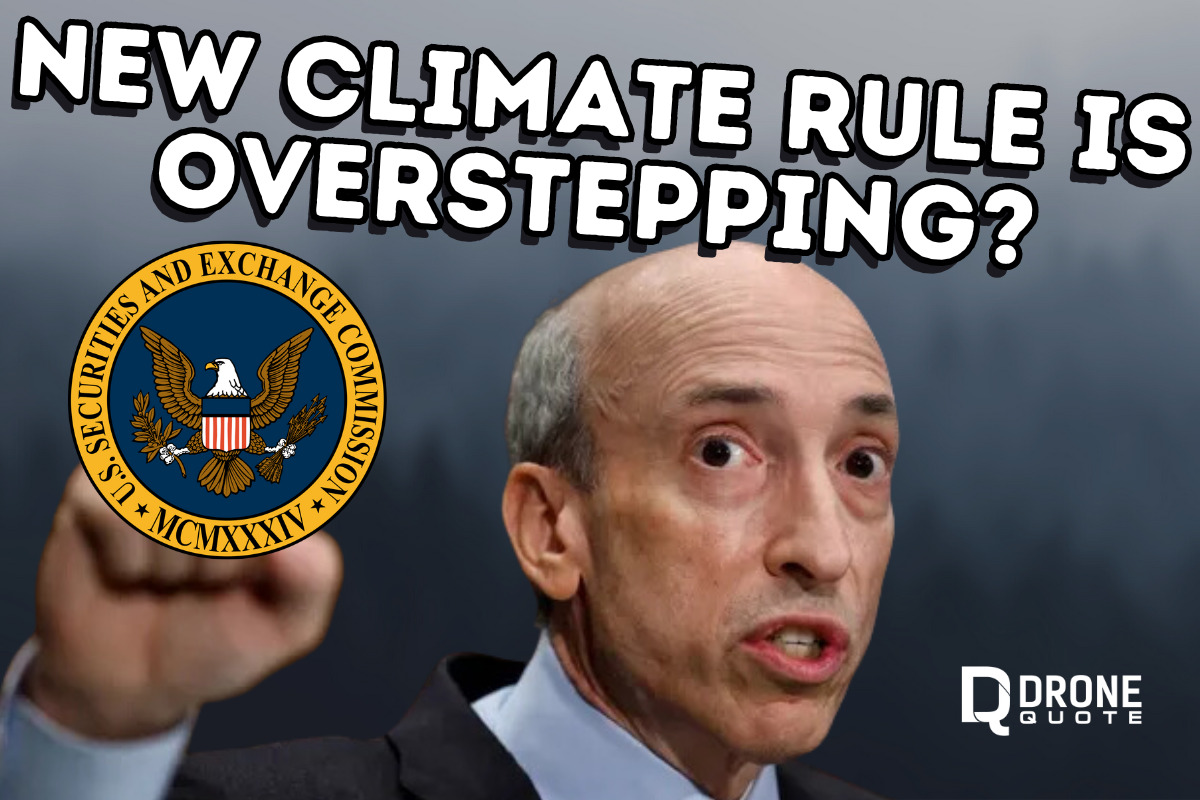SEC New Climate Disclosure Rule with Climate Change
The Securities and Exchange Commission (SEC) proposes new regulations requiring public companies to disclose climate-related information in their filings. This includes details on greenhouse gas emissions, climate-related risks, and governance strategies. While proponents argue this enhances transparency and empowers investors, the rule faces criticism for potential burdens on businesses and exceeding the SEC’s authority.
Key Takeaways
| The SEC's proposed rule aims to standardize climate-related disclosures for public companies, aligning with similar regulations emerging globally. |
| The rule requires reporting on greenhouse gas emissions (Scopes 1, 2, and potentially 3), climate-related risks and their impact on business, and relevant governance practices. |
| While intended to benefit investors with valuable decision-making information, the rule has drawn opposition from businesses concerned about excessive costs and overreach by the SEC. |
What is the SEC’s climate rule?
Following two years of careful consideration, the Securities and Exchange Commission is anticipated to release a definitive regulation mandating that public corporations provide details on climate-related matters to their investors. This announcement is likely to be made in the early part of March 2024.
The regulation considers aspects of climate-related data significant for investors: levels of greenhouse gas emissions and the company’s vulnerability to climate-related risks such as severe weather events or future regulations. Although some companies currently choose to disclose this information voluntarily through other means, the new rules will make it obligatory for companies to report on climate-related issues. They will establish a standard framework for such disclosures as a crucial component of a company’s financial responsibilities.
Critical aspects of the proposed SEC Climate Rules
Greenhouse Gas Emissions Reporting:
- Companies must disclose direct emissions (Scope 1) and emissions from purchased energy (Scope 2).
- Including indirect emissions from the value chain (Scope 3) might be required if they are significant or if the company considers them in their emissions targets.
- While not mandatory, including Scope 3 data shows responsible data management and traceability throughout the value chain.
- Similar requirements are emerging in the EU’s Corporate Sustainability Reporting Directive (CSRD).
Governance and Risk Management:
- Companies must disclose details about climate-related risks that could impact their business, finances, or operations.
- This includes reporting on governance structures and relevant risk management processes for managing these risks.
- Companies must also explain how these risks affect their strategy, business model, and financial outlook, along with the impact of climate events and transition activities on their financial statements.
Comparability with International Standards:
- The SEC’s proposal aligns with climate disclosure standards in the UK and EU and the IFRS‘s draft ISSB requirements.
- However, the SEC’s scope is narrower and focuses more on financial metrics.
Challenges and Implications:
- Reporting Scope 3 emissions can be challenging due to their complexity and the involvement of entities outside the company’s direct control.
Impact on Companies and Investors:
- These rules aim to provide investors with consistent, comparable, and valuable information for investment decisions.
- Companies benefit from precise reporting requirements, while investors gain reliable information about climate risks.
Transition Periods:
- The SEC is expected to include transition periods in the final rules, with details provided upon official adoption.
The SEC Climate Disclosure filing deadlines
| Registrant Type | Disclosure Compliance | Date |
|---|---|---|
| All proposed disclosures: Scope 1 and 2 | All proposed disclosures: Scope 3 | |
| Large Accelerated Filer | Fiscal year 2024 (filed in 2025) | Fiscal year 2025 (filed in 2026) |
| Accelerated Filer and Non-Accelerated Filer | Fiscal year 2025 (filed in 2026) | Fiscal year 2026 (filed in 2027) |
| Smaller Reporting Companies (SRCs) | Fiscal year 2026 (filed in 2027) | Exempted |
The SEC Climate Disclosure timeline
March 2021: The SEC announces its focus on establishing standardized climate-related disclosures for public companies.
March 2022: The SEC proposes new rules to enhance and standardize climate disclosures for investors.
2022-2023: The proposed rules undergo discussions, public feedback, and further development.
December 2023: The finalization of the rules is delayed, with the expected adoption pushed to April 2024.
April 2024: The current anticipated date for the final adoption of the climate disclosure rules.
2025: If adopted, larger companies are expected to begin reporting their climate data in their 2024 10K filings, due in 2025.
To whom do the SEC Climate Rules apply?
Publicly traded US companies already mandated to report to the SEC must also disclose specific climate-related information in their registration and periodic reports. Foreign companies listed on US stock markets and filing 20-F forms with the SEC will also be subject to these requirements. Companies interested in building a reputable presence in the sustainable economy should prioritize compliance with these regulations by sharing their climate-related progress. By doing so, they can position themselves to succeed in a market increasingly prioritizing sustainability. Businesses looking to attract investor attention and gain a competitive edge to drive sales and boost revenue should consider collecting and reporting on their ESG data before mandatory requirements.
Why this is a bad idea?
The new SEC rule would mark a considerable shift for publicly traded firms. Numerous significant corporations currently issue voluntary sustainability disclosures. Moreover, the SEC’s suggestion, featuring numerous detailed and uniform criteria, offers shareholders dependable, comparable, and valuable data for making informed decisions. However, it feels like an oversight on their part, as if the SEC is stepping over their boundaries.
Most companies are already disclosing their greenhouse gas emissions and climate-related risks voluntarily; it can be a problem when this is done as a requirement or an obligation. Furthermore, the creation of these regulations has sparked significant debate, particularly among opponents such as business groups and members of the Republican party, who have raised doubts about the agency’s legal right to implement such broad rules aimed at regulating the economy and businesses. The commission is not tasked with overseeing business operations or climate-related policies.
Litigation Risks (those against the rule)
The proposed SEC climate disclosure rule, particularly its requirement for Scope 3 emissions reporting, has drawn intense criticism. Businesses argue the rule demands excessive disclosure and could be financially burdensome, while Republicans see it as government overreach disguised as promoting climate action. These concerns raise the possibility of extensive legal challenges from corporations, potentially based on the Administrative Procedure Act (APA). Companies might argue the SEC failed to justify the rule adequately, neglected to assess its impact on businesses properly, and didn’t sufficiently consider public input. These potential lawsuits highlight the significant opposition and legal hurdles the proposed rule faces before full implementation.
Investors don’t care about pollution they care about returns.
The new rule states that the visibility of Scopes 1, 2, and 3 regarding green house gass emissions and climate-related risks will allow investors to choose the company they invest into. However, that is not always the case. Mainly since companies already exist in voluntary efforts to disclose their emissions even without the new rule. Moreover, these investors will not focus on the environmental side of the company, instead, more of the montery return-of-investment. This is not saying that all investors do this, but there is a higher tendency for these inventors to reap what they deem worth in terms of returns.
Who’s responsible for a company’s pollution?
The Company Itself
While some argue against environmental regulations, the reality is that pollution poses a significant threat to human health. Companies can be held legally liable for their actions when their practices cause harm through various forms of pollution, including:
- Dust Hazards: Exposure to toxic dust, such as silica and asbestos, can lead to fatal lung diseases, asthma, and other respiratory problems. Industries like construction, sandblasting, and foundries must take precautions to prevent the release of harmful dust particles.
- Mismanaged Waste: Improper disposal of waste products, significantly those containing chemicals, detergents, or heavy metals, can contaminate water supplies. Drinking polluted water can cause developmental problems, reproductive issues, and neurological disorders, particularly in children. Companies responsible for such contamination can face legal consequences.
- Dangerous Chemical Exposure: Improper disposal and leaks of harmful chemicals can pollute air and water, exposing individuals to various health risks. Pesticides, for example, have been linked to cancer, reproductive problems, and endocrine disruption. Companies that are negligent in handling dangerous chemicals can be held accountable for the resulting health issues.
The Consumer
Our consumer habits significantly contribute to climate change. Many global greenhouse gas emissions come from the production and use of everyday goods. Wealthier individuals and countries have a more significant impact due to increased consumption. While some argue economic growth relies on consumption, this endless cycle is unsustainable. We should strive to be more mindful consumers to reduce our environmental impact. This can involve buying fewer things, choosing used or ethically made items, and repairing what we already own. Governments can also play a role by implementing policies that encourage sustainable practices, such as requiring repairable products. Additionally, we can adopt more sustainable holiday traditions by giving thoughtful gifts, using reusable wrapping materials, and opting for local food options.
Conclusion
If implemented, the SEC’s climate disclosure rule will significantly impact how public companies report their environmental footprint and related risks. While the goal of transparency is commendable, the rule’s potential economic and legal hurdles remain to be addressed before it can be fully adopted.

Embrace A Sustainable Life
Stay informed about the ongoing debate surrounding the SEC’s climate disclosure rule. Consider the perspectives of both businesses and investors and engage in responsible consumption practices to contribute to a sustainable future. Sign up to know more!
Frequently Asked Questions (FAQ) on Climate Change
1. What is climate change?
Climate change refers to long-term changes in Earth’s average temperature and weather patterns. It is primarily driven by human activities that increase greenhouse gas emissions into the atmosphere, leading to global warming.
2. How is global warming related to climate change?
Global warming is a part of climate change and refers to the increase in Earth’s average surface temperature, primarily due to the release of greenhouse gases from human activities.
3. What are emissions, and how do they contribute to climate change?
Emissions refer to releasing gases like carbon dioxide and methane into the atmosphere, which trap heat and lead to the greenhouse effect, causing climate change by warming the planet.
4. What are the effects of climate change on the environment and society?
The effects of climate change include rising global temperatures, melting ice sheets and glaciers, shrinking sea ice, sea level rise, more extreme weather events, and disruptions to ecosystems and human livelihoods.
5. How does global climate change impact the world?
Global climate change has wide-ranging impacts on the Earth’s systems, affecting weather patterns, biodiversity, agricultural productivity, sea levels, and human health and well-being.
6. What is the role of climate science in understanding climate change?
Climate science involves studying Earth’s climate system, including the interactions between the atmosphere, oceans, land, and ice. It helps us understand the drivers of climate change and its consequences.

